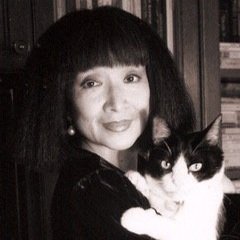
Kyoko Michishita
Photo by Laurie Toby Edison from Women from Japan
Kyoko Michishita
Kyoko Michishita is a Japanese artist, writer, and translator based in Tokyo. With her belief in pacifism, feminism and art, she has been writing and translating books and articles for almost four decades. Born in Kholmsk, Sakhalin in 1942, she and her family escaped to Hokkaido, Japan the year after the end of World War II. She studied journalism at the University of Wisconsin, graduating in 1967. From 1970 through 1997 she served as the Arts Program Specialist of the Tokyo American Center, where she presented work by Maya Deren, Kenneth Anger, Jonas Mekas, Nam June Paik, Bill Viola and many others.
In the 1970s Michishita was an early member of the collective Video Hiroba, and began producing her own films and videos in 1974. Her video Being Women in Japan: Liberation within My Family (1973-74) is in the collection of the Museum of Modern Art (New York), and her other films and videos have been screened at many festivals, galleries, and museums across Japan and internationally. She has published several Japanese translations of work by and about Gloria Steinem, Georgia O’Keeffe and many others. Her own books include the essay collection Sensual Life (1980), the autobiographical nonfiction Farewell to Sakhalin (1995), and the novel The Blue Hour (2008).
[Photo credit: Laurie Toby Edison from Women of Japan]
Kyoko Michishita's videos and films are distributed by Vtape; please contact distribution@vtape.org for more information.
LIST OF WORKS
Yoko Ono in Japan: Let’s Have a Dream (video, b&w, 58 min., sound, 1974)
Women’s Liberation is Human Liberation (video, b&w, 34 min., sound, 1974)
Being Women in Japan: Living with the Ocean (video, b&w, 51 min., sound, 1974)
Being Women in Japan: Liberation within my Family (video, b&w, 32 min., sound, 1974)
Tokkari Peninsula (video, b&w, sound, 6 min., 1974)
Eating (video, b&w, 31 min., sound, 1975)
Cherry Blossoms (16mm film, color, sound, 16 min., sound, 1975)
Tempra (16mm film, color, silent, 9 min., 1975)
Mother, Shizue Michishita (video, b&w, sound, 30 min., 1975)
My Mother Talks About her Experiences in Sakhalin (video, b&w, sound, 30 min., 1975)
My Mother in Tokyo: Her First Visit with Me in Tokyo (video, b&w, sound, 30 min., 1975)
Two Highlights in a Life of a Woman (video, b&w, sound, 4 min., 1976)
In My Town I, II and III (16mm film, color, sound, 11 min., 1976)
White Dream (video, b&w, sound, 30 min., 1978)
Gloria Steinem (video, b&w, sound, 30 min., 1978)
A Visit to my Father’s Hometown Takojima 1 (video, 30 min., 1979)
A Visit to my Father’s Hometown Takojima 2 (video, 30 min., 1979)
A Visit to my Father’s Hometown Takojima 3 (video, 30 min., 1979)
A Visit to my Father’s Hometown Takojima 4 (video, 30 min., 1979)
Dinner with a Friend (video, b&w, sound, 61 min., 1980)
Video Portraits – Men: Sakumi Hagiwara (video, color, sound, 20 min., 1982)
Video Portraits – Men: Makoto Wada (video, color, sound, 37 min., 1982)
Video Portraits – Men: Akiyuki Nosaka (video, color, sound, 25 min., 1982)
Video Portraits – Men: Yuya Uchida (video, colou, sound, 24 min., 1982)
Video Portraits – Men: Koichi Inakoshi (video, color, sound, 25 min., 1982)
Video Portraits – Men: Kohay Ando (video, color, sound, 23 min., 1982)
Video Portraits – Men: Ikuyoshi Shibukawa (video, color, sound, 10 min., 1982)
Video Portraits – Men: Kiyoshi Awazu (video, color, sound, 13 min., 1982)
Video Portraits – Men: Ryoichi Enomoto (video, color, sound, 8 min., 1982)
Video Portraits – Men: Maki ISHII (video, color, sound, 10 min., 1982)
Video Portraits – Men: Shuntaro Tanikawa (video, color, sound, 10 min., 1982)
Video Portraits – Men: Issey Miyake (video, color, sound, 22 min., 1982)
Video Portraits – Men: Yoshio Katakoa (video, color, sound, 12 min., 1982)
Video Portraits – Men: Ryodu Uzaki (video, color, sound, 14 min., 1982)
Video Portraits – Men: Ryu Murakami (video, color, sound, 14 min., 1982)
My Mother in my Apartment in Tokyo (video, 30 min, 1982)

